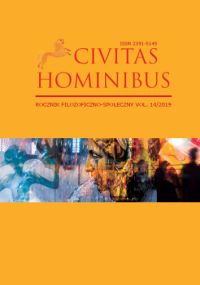14/2019
Abstract: During the last few years, politicians have increasingly referred to the will of ‘the people’ to justify their decisions. This article discusses the limits of the idea of representation, which is the main principle of democracy. In democratic countries ‘the people’ exercise their authority through representatives. According to populists, the democratic system needs to be changed to give voice to ‘the people’. Elected representatives are both subordinate to ‘the people’ and govern them. This construction raises questions about the extent of power which representatives have. Where should the power of ‘the people’ end and in what circumstances should representatives know better than vox populi? Today there are many areas to which ‘the people’ have no access.
Keywords: representation, ‘the people’, democracy
Abstract: Research on the thought of Shmuel N. Eisenstadt (1923-2010), as well as studies continuing and developing his ideas, is gaining traction in different corners of the world. This fact is not surprising since the results of his own extensive research are usually considered as one of the most important and original products in the field of sociology, philosophy of civilisation, philosophy of culture, as well as the philosophy of politics and society of the mid-20th and early 21st century. This article offers a critical presentation of several important threads of a recent book entitled Varieties of multiple modernities: New Research Design (hereinafter: Varieties) that engages with the theories of Shmuel N. Eisenstadt.
This book is a very important contribution to work on the thought of the Israeli sociologist and it moves beyond his ideas. The authors make an attempt to face current issues and events in the world around us. Whether or not the tools provided by Eisenstadt help in this type of endeavour, I leave the readers of Varieties to judge. The book, a result of an interdisciplinary project, is a huge source of knowledge. It can be an inspiration for representatives of various disciplines.
Keywords: Shmuel N. Eisenstadt, Prayer G., multiple modernities, global studies, theory of indeterminacy, transglobality, transnationalism
Abstract: Against the backdrop of dynamic global social changes, as well as changes in the biogeographic environment, one of the important roles of the state is as a regulator of economic life. Economic policy is a state tool in this field. The aim of the article is to present one of the economic policy models – social market economy policy, against the background of creating a new reality for the first half of the 21st century.
Keywords: social changes, state activity, economic policy
Abstract: In Polish society, after a period of fascination with ‘abroad’, patriotic attitudes are being revived. This ‘patriotism’ takes different forms, including the form of economic patriotism. It is often reduced to consumer ethnocentrism, but it also has a wider dimension. It should concern the attitudes of consumers and entrepreneurs. It cannot, however, take the form of economic chauvinism.
Keywords: nationalism, chauvinism, patriotism, economic patriotism
Abstract: In this article, I contribute to the discussion on contemporary virtue ethics. I present one of the major problems connected with moral education and I argue that modifying virtue ethics in order to make it more similar to the non-directive model would reduce the strength of some of the objections against the methods and mechanisms used in the process of shaping character. As one of the possible ways of bringing virtue ethics closer to the non-directive model I suggest taking into account Thomas Nagel's typology of reasons for action.
Keywords: virtue ethics, upbringing, reasons for action, Thomas Nagel, ethical pluralism


